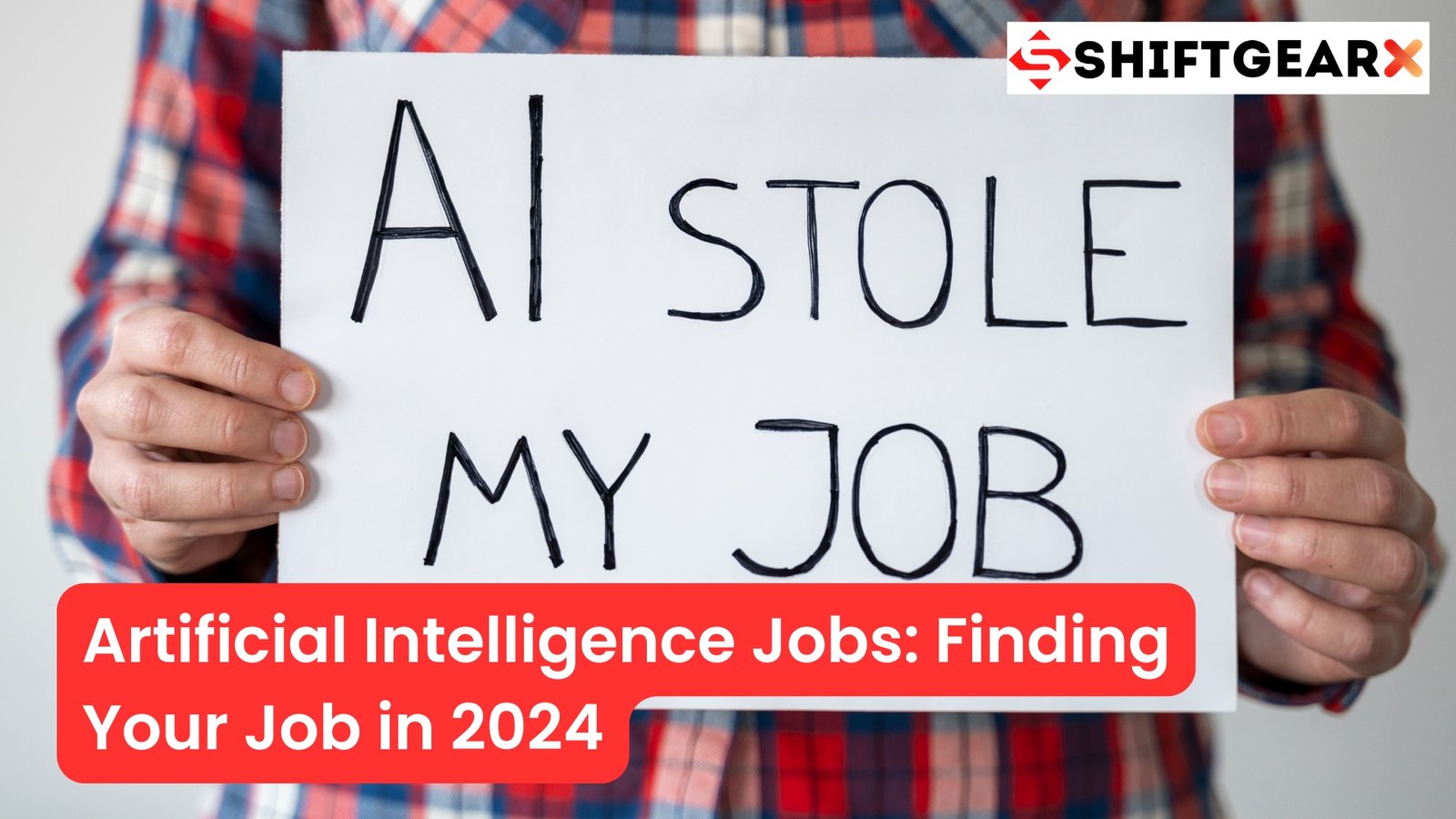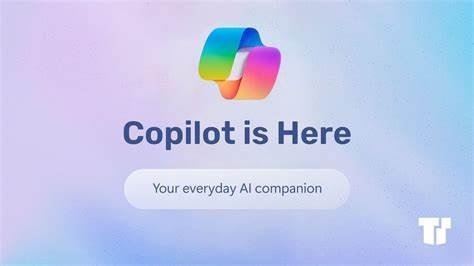Is this your Situation?
You’re sitting in a bustling coffee shop, laptop open, frantically scrolling through job listings. The aroma of freshly brewed coffee fills the air, but you barely notice it. Your eyes are fixed on the screen, scanning for keywords like “artificial intelligence jobs”, “machine learning,” “data science,” and “neural networks.” Sound familiar?
If you’re like many job seekers today, you might be feeling overwhelmed by the rapidly evolving landscape of artificial intelligence jobs. But don’t worry – you’re not alone, and this article is here to help you chart your course through this exciting new territory.
What is Artificial Intelligence?

Before we dive into the job market, let’s start with the basics. What exactly is artificial intelligence (AI)?
Artificial intelligence is the creation of computer systems that can do things usually done by humans. These tasks include seeing and understanding images, recognizing speech, making decisions, and translating languages. AI systems learn from data, identify patterns, and make decisions with minimal human intervention.
Think of it this way: if traditional computer programs are like a detailed recipe that tells you exactly how to make a dish, AI is more like a chef who learns from experience, adapts to available ingredients, and can create new recipes on the fly. Things are changing drastically. I wrote a blog on this – AI and Future Trends: Shaping Tomorrow’s World – Tech News Before It’s News | Shift GearX. Read it to understand more!
AI Consultants are those people that provide insights to businesses with big data and product demonstrations. They use “agile methodologies” in an agile environment with various teams to achieve organizational goals! Think of agile as – doing smaller projects instead of one big project. Although there are many small projects, all of these have their stories aligned to achieve the one big project.
What are the Streams in Artificial Intelligence

AI encompasses several subfields:
-
Machine Learning: This is the backbone of most AI systems today. It involves algorithms that improve automatically through experience.
-
Deep Learning: A subset of machine learning based on artificial neural networks. It’s particularly good at tasks like image and speech recognition.
-
Natural Language Processing (NLP): This focuses on the interaction between computers and human language. Engineering teams are constantly focused on improving NLP solutions.
-
Computer Vision: This field is focused on teaching computers to understand and interpret images or videos at a deep level.
-
Robotics: This involves the design, construction, and use of robots, often incorporating other AI technologies.
Now that we have a basic understanding of AI, let’s explore the job landscape it has created.
The AI Job Market: Top Artificial Intelligence Jobs in a Brave New World
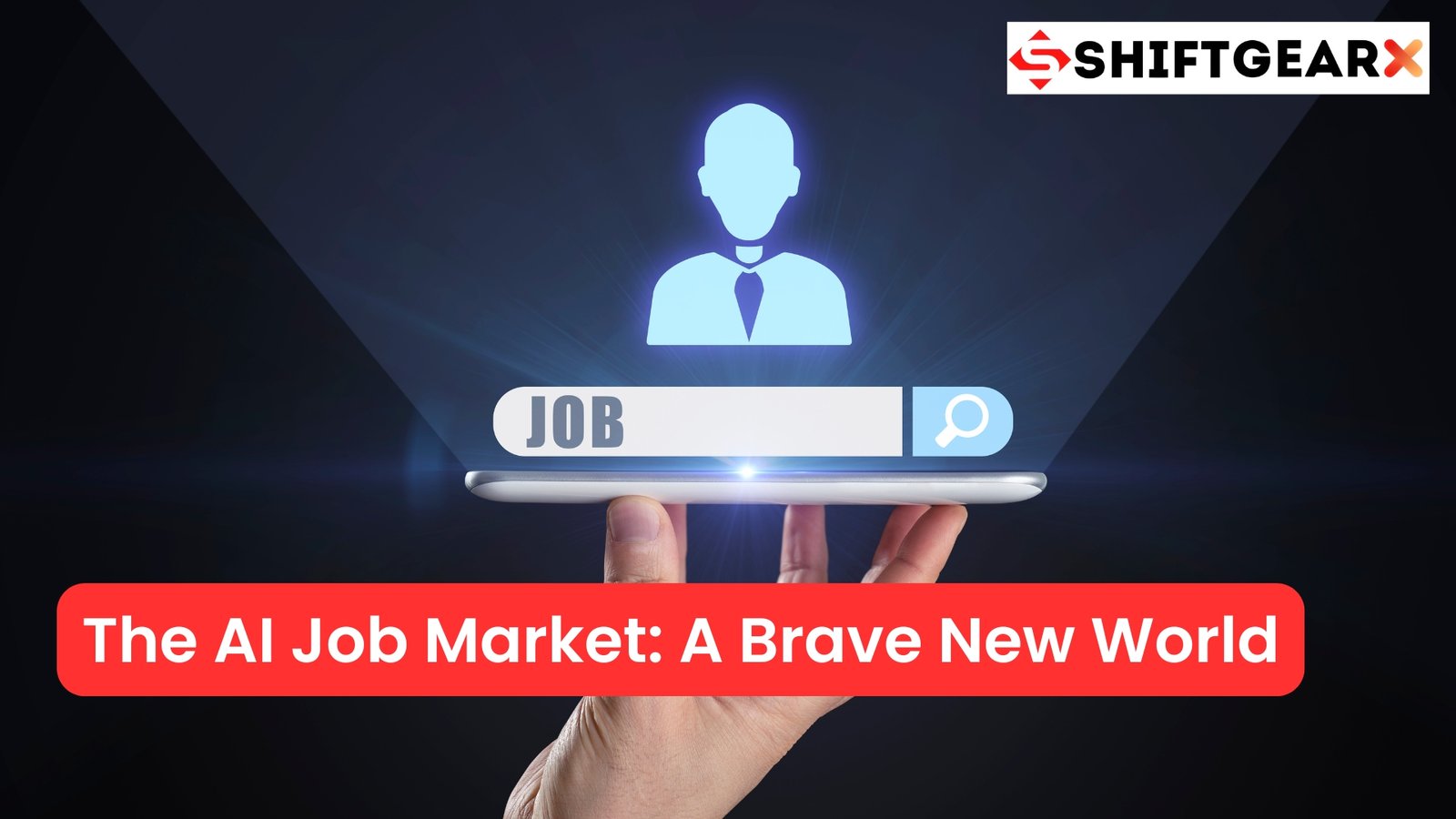
Let’s face it: the job market isn’t what it used to be. Gone are the days when a degree and a firm handshake could land you a lifelong career. Today’s world is all about adaptation, continuous learning, and staying ahead of the curve.
A huge number of VC Firm APP Development startups have risen and all of them (or most of them) are trying to come up with new technologies to solve business problems. We never knew what a customer success team was all about. Now we do!
This is all happening in the field of artificial intelligence. Artificial intelligence companies in sectors like software, cybersecurity, and health tech are leading the charge in hiring, emphasizing the need for technological and analytical expertise.
The growth is exponential. Companies are investing millions to develop training materials, and coaching team members to rise to the challenge. Everyone is focused on achieving business objectives and drive customer success.
My Experience in this Area

As someone who’s been in the tech industry for over two decades, I’ve seen firsthand how AI has transformed the job market. When I first started out, “AI specialist” wasn’t even a job title. Now? It’s one of the hottest career paths out there.
But here’s the thing: navigating this new frontier can be tricky. With so many opportunities and so much competition, how do you stand out? How do you know which skills to focus on? And most importantly, how do you turn your passion for AI into a rewarding career? How can leaders be providing technical leadership? How can we be identifying system risks in our processes?
With AI, how can we provide consulting services to our cross functional teams and ensure customer success?
That’s exactly what we’re going to explore in this article. So, grab your favorite beverage (I’m partial to a strong espresso myself), get comfortable, and let’s dive in!
The AI Job Landscape: What’s Out There?
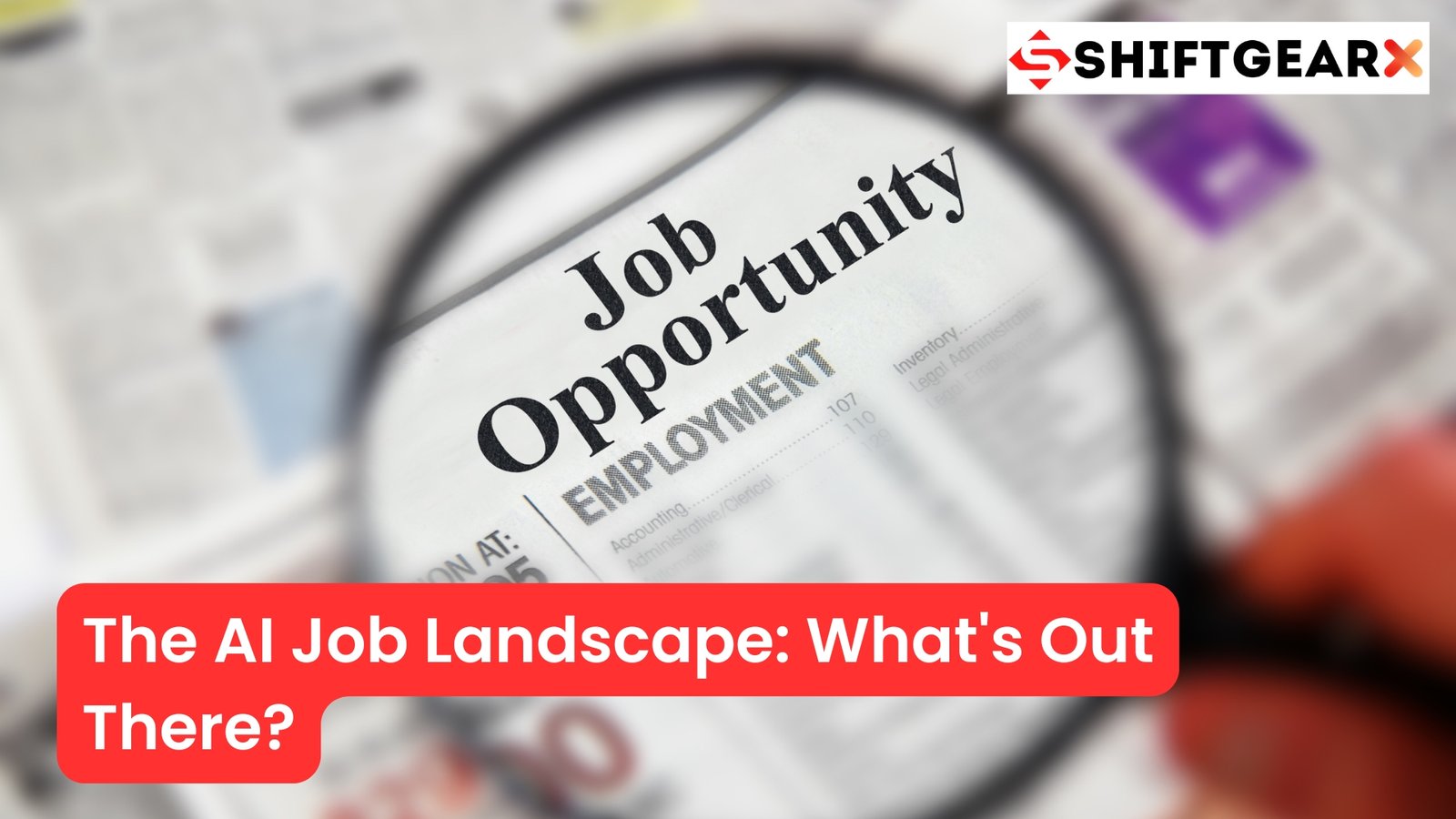
The field of AI has spawned a diverse array of job roles. Let’s take a closer look at some of the key positions:
-
Machine Learning Engineer: A Machine Learning Engineer designs and builds machine learning models. They collaborate with data scientists to turn ideas into working models that can be used in real-world applications.
-
Data Scientist: Data scientists collect, analyze, and interpret large amounts of data, often using machine learning techniques to build predictive models, which also includes financial modeling.
-
AI Research Scientist: These are the pioneers pushing the boundaries of AI. They develop new algorithms and approaches to solve complex AI problems.
-
Robotics Engineer: Combining AI with mechanical engineering, robotics engineers design, build, and maintain robots for various applications. They build, maintain and support by answering technical questions.
-
Natural Language Processing (NLP) Specialist: These experts work on making machines understand, interpret, and generate human language and participate in many real world deployments.

-
Computer Vision Engineer: They focus on how computers can understand and process visual information from the world. They use models to incubator computer vision and have strong problem solving skills.
-
AI Ethics Specialist: As AI becomes more prevalent, the key responsibilities of these professionals is to ensure AI systems are designed and used ethically.
-
AI Product Manager: An AI Product Manager oversees the creation of AI products, ensuring that the technical work aligns with the business goals. They act as a link between technical teams and business needs.
-
AI Consultant: These professionals help businesses understand how AI can solve their specific problems and guide implementation by driving high priority projects.
-
AI Trainer/Teacher: With the growing demand for AI skills, there’s a need for educators who can teach AI concepts to others. This role involves developing training material in a way that people understand and conducting training sessions that focus on AI concepts.
Each of these roles requires a unique blend of technical skills, domain knowledge, and soft skills. However, they need to have cross functional collaboration. Let’s dive deeper into what these skills are and why they’re important to find the best Artificial Intelligence Jobs.
The Skills You Need: Building Your AI Toolkit

Success in artificial intelligence jobs requires a combination of technical prowess and soft skills. Let’s break these down and understand why each is crucial:
Technical Skills
-
Programming Languages: Python, R, Java, C++
-
Why it’s important: These languages are the building blocks of AI systems. Python, in particular, is widely used due to its simplicity and the availability of machine learning libraries.
-
-
Machine Learning Frameworks: TensorFlow, PyTorch, Keras
-
Why it’s important: These frameworks provide pre-built components for developing and training AI models, significantly speeding up the development process.
-
-
Data Analysis and Visualization
-
Why it’s important: AI is all about data. The ability to analyze and visualize data is crucial for understanding patterns and communicating insights, putting customer needs first.
-
-
Statistics and Probability
-
Why it’s important: These form the mathematical backbone of many machine learning algorithms. A solid understanding helps in choosing the right models and interpreting results.
-
-
Deep Learning and Neural Networks
-
Why it’s important: Deep learning is behind many recent AI breakthroughs. Understanding neural networks is key to working on cutting-edge AI applications.
-
-
Natural Language Processing
-
Why it’s important: As AI increasingly interacts with humans through language, NLP skills are becoming more valuable. An enablement specialist will have good knowledge of AI to support product health, content development and would have worked with
-
-
Computer Vision
-
Why it’s important: From self-driving cars to facial recognition, computer vision is a key component of many AI applications.
-
Soft Skills

-
Problem-solving
-
Why it’s important: AI is all about solving complex problems. The ability to break down problems and think creatively is crucial. To do that you need strong communication skills to show business value.
-
-
Critical thinking
-
Why it’s important: AI professionals need to evaluate different approaches, understand their implications, and make informed decisions.
-
-
Communication
-
Why it’s important: You’ll often need to explain complex AI concepts to non-technical stakeholders.
-
-
Teamwork
-
Why it’s important: AI projects often involve collaboration between different specialists.
-
-
Adaptability
-
Why it’s important: The field of AI is rapidly evolving. Being able to quickly learn and adapt to new technologies is essential.
-
-
Creativity
-
Why it’s important: Developing innovative AI solutions often requires thinking outside the box.
-
-
Ethical reasoning
-
Why it’s important: As AI systems increasingly impact people’s lives, understanding and addressing ethical implications is crucial.
-
Remember, you don’t need to master all of these skills immediately. Start with a solid foundation and then specialize based on your interests and the needs of the job market.
Breaking into the Field: Your AI Career Roadmap for Solving Complex Business Issues

Alright, so you’ve got an idea of what artificial intelligence jobs are out there and the skills you need. But how do you actually break into the field? Here’s a step-by-step roadmap:
-
Education: While a degree in computer science, mathematics, or a related field is helpful, it’s not always necessary. Many successful AI professionals come from diverse backgrounds. What matters most is your skills and passion for learning.
-
Online Courses and Certifications: Platforms like Coursera, edX, and Udacity offer excellent AI and machine learning courses. Some even partner with tech giants like Google and IBM to offer professional certificates.
-
Projects and Portfolio: Build, build, build! Personal projects are your chance to apply what you’ve learned and show potential employers what you can do. GitHub is your friend here.
-
Internships and Entry-level Positions: Look for opportunities to get your foot in the door. Many artificial intelligence companies offer internships and entry-level positions that can provide valuable experience and a pathway into the industry. Even if it’s not your dream AI job right away, any experience in the tech industry can be valuable.
-
Networking: Join AI communities, attend meetups and conferences, and connect with professionals in the field. You’d be surprised how many opportunities come through personal connections.
-
Stay Updated: The AI field moves fast. Make it a habit to read AI research papers, follow industry news, and continuously update your skills.
Remember, everyone’s path is different. I know a guy who landed his first AI job after winning a Kaggle competition. Another friend got her break by contributing to an open-source AI project. The key is to find opportunities that align with your strengths and interests.
The AI Job Search: Tips and Tricks
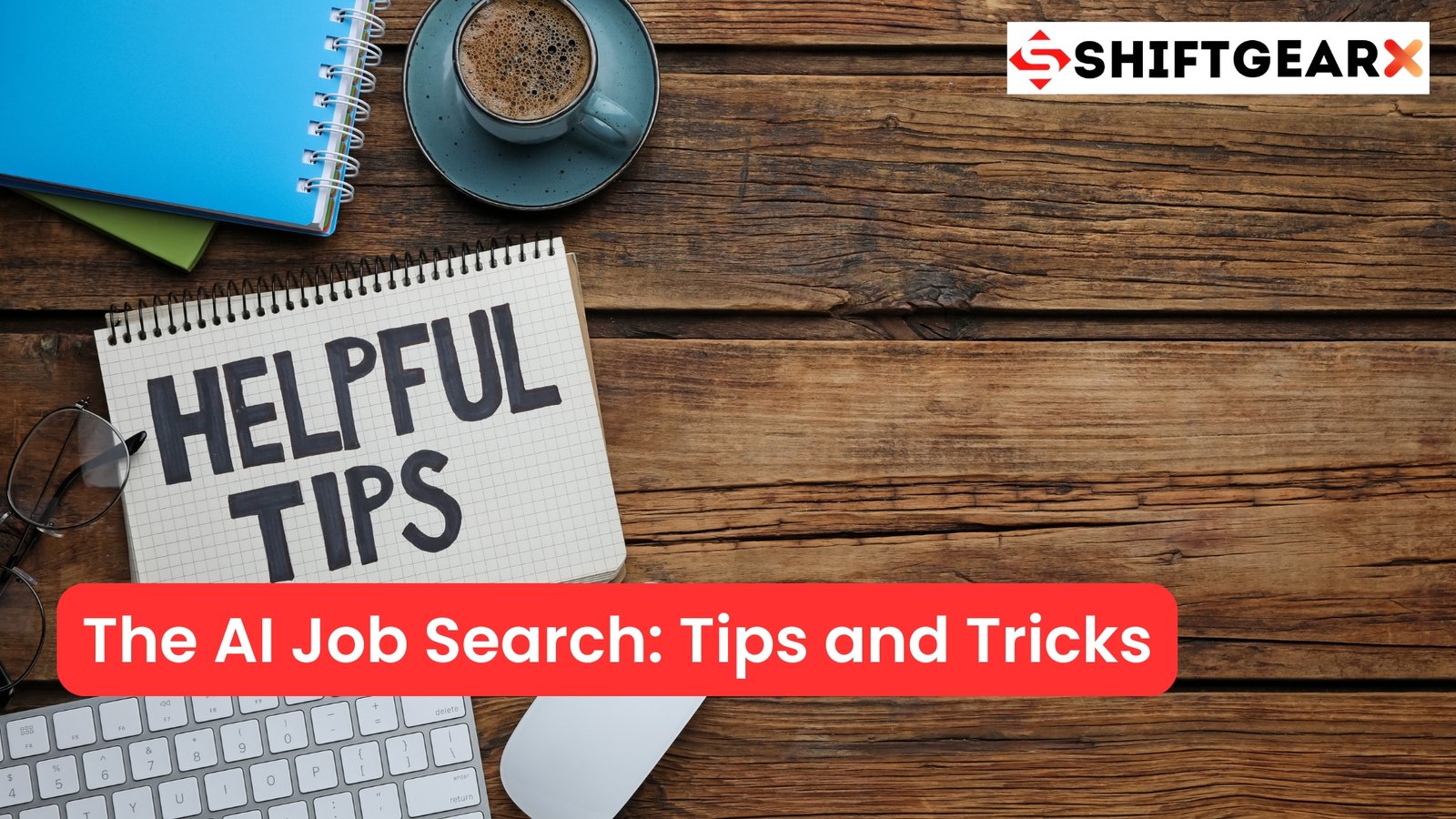
Now that we understand the landscape and the required skills, let’s dive into how to actually land one of these artificial intelligence jobs. Here are some detailed tips and tricks, complete with examples:
-
Tailor Your Resume:
-
Example: If you’re applying for a Natural Language Processing role, highlight any projects or experience you have with text analysis, sentiment analysis, or chatbots. Use keywords from the job description, such as “BERT,” “word embeddings,” or “text classification.”
-
-
Craft a Compelling Cover Letter:
-
Example: “As someone who’s been fascinated by language since I learned to code, I’m excited about the opportunity to work on NLP projects at XYZ Corp. I believe my experience in developing a sentiment analysis tool for customer reviews, combined with my passion for understanding and replicating human language patterns, makes me a strong fit for this role.”
-
-
Prepare for Technical Interviews:
-
Example: Be ready to explain concepts like overfitting, regularization, or the differences between supervised and unsupervised learning. Practice coding challenges on platforms like LeetCode or HackerRank, focusing on algorithms and data structures commonly used in AI.
-
-
Showcase Your Work:
-
Example: Create a GitHub repository with your AI projects. For instance, you could include a project where you built a image classification model using convolutional neural networks, complete with documentation explaining your approach and results.
-
-
Network, Network, Network:
-
Example: Join AI-focused groups on LinkedIn or attend local meetups. For instance, you might attend a talk on “The Future of AI in Healthcare” and connect with speakers or other attendees afterwards.
-
-
Consider Non-traditional Paths:
-
Example: Look for AI roles in industries like finance, healthcare, or retail. For instance, a bank might be looking for an AI specialist to develop fraud detection algorithms.
-
-
Be Persistent:
-
Example: If you don’t get a job you applied for, reach out to the recruiter or hiring manager for feedback. Use this information to improve your skills or application for next time.
-
How to Start Enhancing Your AI Skills
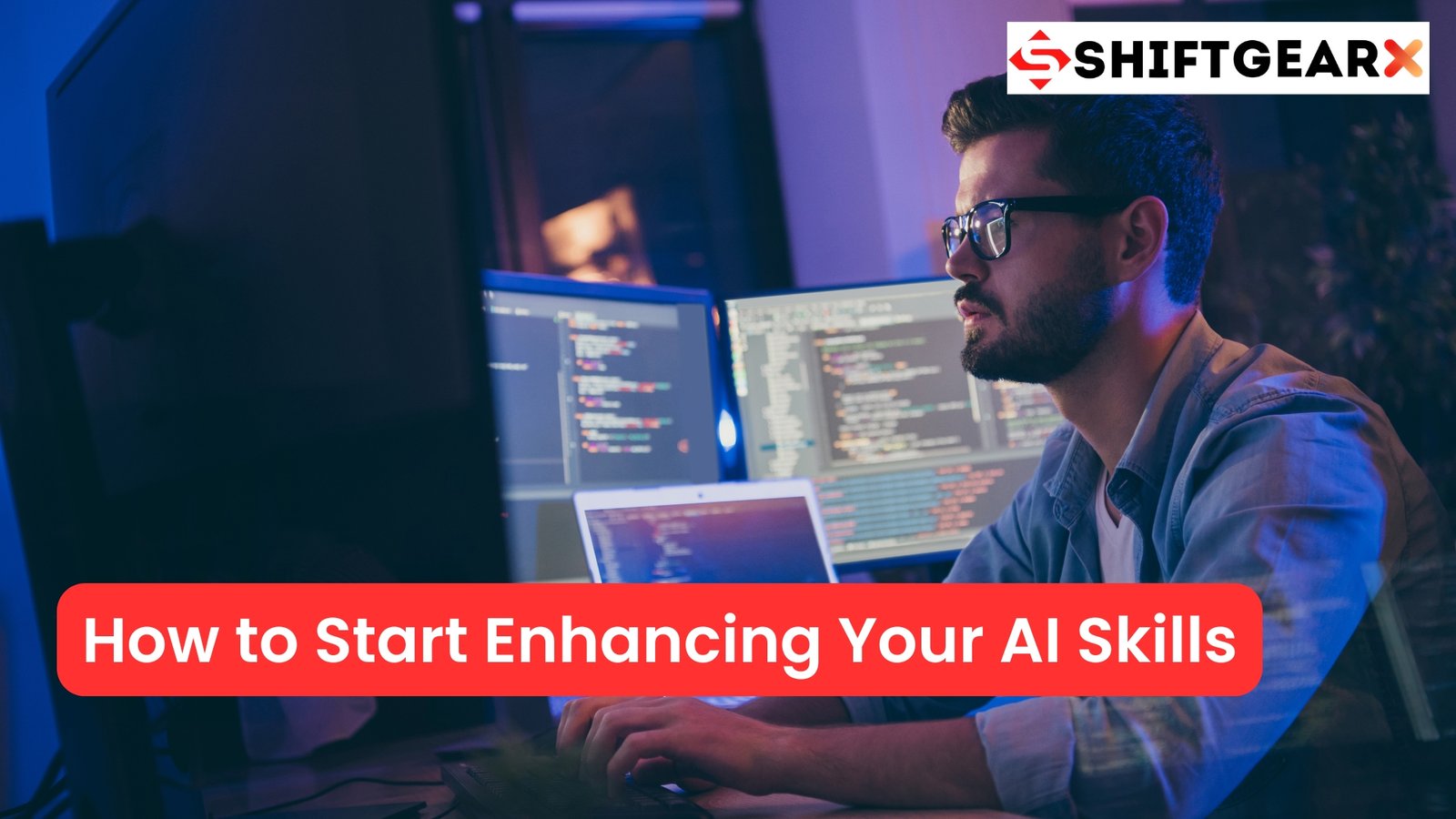
Embarking on a career in AI can seem daunting, but with the right approach, you can steadily build your skills. Here’s how to get started:
-
Start with the Basics:
-
Begin with fundamental courses in programming (particularly Python) and mathematics (especially linear algebra, calculus, and statistics).
-
Resource: Coursera’s “Mathematics for Machine Learning” specialization is a great starting point.
-
-
Move on to Machine Learning Fundamentals:
-
Learn about core ML concepts like supervised and unsupervised learning, model evaluation, and feature engineering.
-
Resource: Andrew Ng’s “Machine Learning” course on Coursera is widely regarded as an excellent introduction.
-
-
Dive into Deep Learning:
-
Once you’re comfortable with ML basics, explore neural networks and deep learning.
-
Resource: The “Deep Learning Specialization” on Coursera, also by Andrew Ng, is comprehensive and well-structured.
-
-
Specialize Based on Your Interests:
-
Choose an area to focus on, such as NLP, computer vision, or reinforcement learning.
-
Resource: For NLP, the “Natural Language Processing Specialization” on Coursera is a good choice.
-
-
Practice, Practice, Practice:
-
Apply what you’ve learned through projects and coding exercises.
-
Resource: Kaggle offers datasets and competitions that are great for honing your skills.
-
-
Stay Updated:
-
Follow AI research papers and industry news.
-
Resource: Websites like arXiv.org for research papers, and AI news aggregators like AI Weekly.
-
-
Join the Community:
-
Engage with other AI enthusiasts and professionals.
-
Resource: Participate in AI-focused subreddits, join local AI meetups, or attend conferences like NeurIPS or ICML.
-
-
Consider Advanced Education:
-
While not always necessary, a master’s or PhD in AI, machine learning, or a related field can open up more opportunities, especially in research roles.
-
6-week journey to learning Foundational AI:
| Week | Focus Area | Key Activities | Resources | Outcome |
|---|---|---|---|---|
| Week 1 | Introduction to AI & Python Basics | – Understand AI concepts and history – Learn Python basics – Set up development environment |
– Online courses (Coursera, edX) – Python tutorials (Codecademy) |
– Basic understanding of AI – Python installed and configured |
| Week 2 | Data Science Fundamentals | – Learn about data types, data collection, and cleaning – Introduction to pandas and NumPy libraries |
– Data science courses (Kaggle) – Python libraries tutorials |
– Ability to handle and preprocess data |
| Week 3 | Introduction to Machine Learning | – Learn supervised and unsupervised learning – Implement basic ML models (linear regression, k-means) |
– Machine learning courses (Coursera, Udemy) – Scikit-learn library tutorials |
– Basic ML models implemented |
| Week 4 | Deep Learning Basics | – Introduction to neural networks – Build simple neural networks using TensorFlow or PyTorch |
– Deep learning courses (Fast.ai) – TensorFlow/PyTorch tutorials |
– Simple neural networks created |
| Week 5 | Computer Vision & NLP | – Learn image classification and object detection – Introduction to Natural Language Processing (NLP) |
– Computer vision tutorials – NLP courses (Hugging Face) |
– Basic image and text processing models |
| Week 6 | AI Projects & Deployment | – Work on a small AI project (e.g., image classifier, sentiment analysis) – Learn model deployment |
– Project-based learning (GitHub projects) – Model deployment tutorials (Flask, Docker) |
– Completed AI project – Model deployed and running |
Remember, learning AI is a journey, not a destination. The field is constantly evolving, so continuous learning is key. Start with small steps, celebrate your progress, and don’t be afraid to take on challenging projects. With persistence and passion, you’ll be well on your way to a exciting career in artificial intelligence!
The Future of AI Jobs: Market Trends and What’s Next?

As we wrap up our journey through the landscape of artificial intelligence jobs, let’s take a moment to look ahead. What does the future hold for AI professionals?
Well, if current trends are any indication, the future looks bright. According to the World Economic Forum, AI is expected to create 97 million new jobs by 2025. Artificial intelligence companies will be at the forefront of this growth, driving innovation and creating new opportunities across various sectors. And these aren’t just technical roles – we’re talking about jobs that blend AI with other disciplines, from healthcare to environmental science to creative arts.
But here’s the catch: as AI becomes more advanced, the skills needed to work in this field will continue to evolve. The most successful AI professionals will be those who can adapt, continue learning, and bring a multidisciplinary approach to problem-solving.
So, my advice? Stay curious. Keep learning. And most importantly, don’t be afraid to carve your own path in this exciting field.
Wrapping Up: Your AI Journey Starts Now

We’ve covered a lot of ground in this article, from the types of artificial intelligence jobs available to the skills you need and how to land your dream role. But remember, this is just the beginning of your journey.
The world of AI is vast and constantly evolving. It’s challenging, sure, but it’s also incredibly exciting. Every day brings new discoveries, new applications, and new opportunities to make a real impact on the world.
So, are you ready to take the plunge into the world of artificial intelligence jobs? Remember, every expert was once a beginner. Your AI journey starts now – and who knows where it might take you!

Looking forward to Hearing From You
Before you go, I’d love to hear from you. What aspect of AI are you most excited about? Are you already working in the field, or just starting to explore? Share your thoughts in the comments below, and let’s keep the conversation going!
And hey, if you found this article helpful on Artificial Intelligence jobs, why not share it with a friend who’s interested in AI? After all, in the world of artificial intelligence, we’re all in this together.
Happy job hunting, and may the algorithms be ever in your favor!



